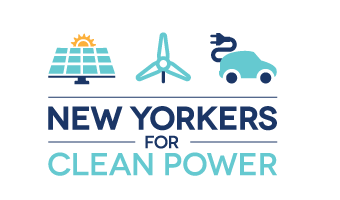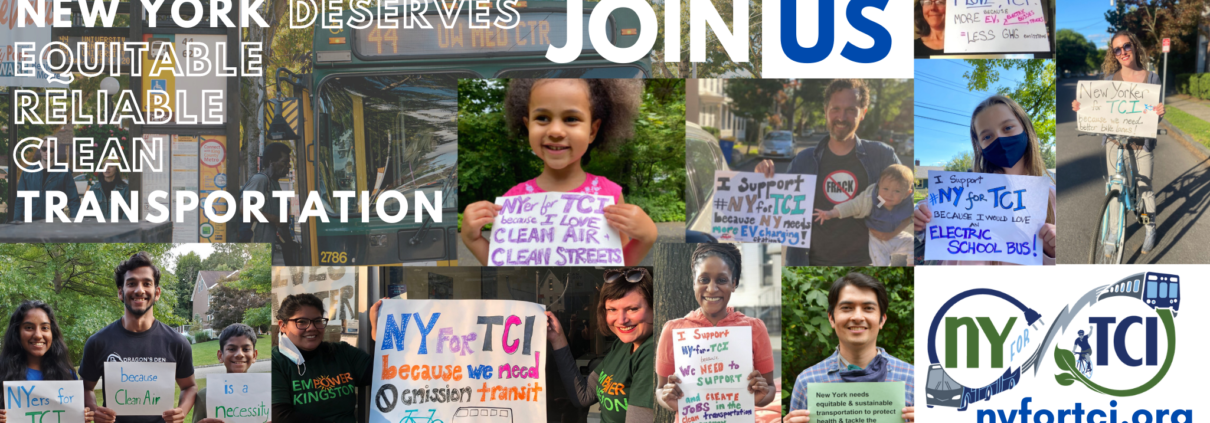FOR IMMEDIATE RELEASE: Wednesday, September 23, 2020
CONTACT
Nick Sifuentes, Executive Director, Tri-State Transportation Campaign
nsifuentes@tstc.org
Lauren Bailey, Director of Climate Policy, Tri-State Transportation Campaign
lauren@tstc.org
Kathleen Gasperini, Director, Communications and Marketing, The Alliance for Clean Energy New York
kgasperini@aceny.org
Transportation & Environment Advocates Launch ‘NY for TCI’ Campaign
‘NY for TCI’ includes leading voices in health, transportation, environment, business, and clean energy working together to achieve an equitable and sustainable Transportation and Climate Initiative (TCI) program.
New York, NY – Today, a coalition of New York State transportation, business, health, clean energy, and environmental advocates launched ‘NY for TCI’ — a campaign focused on achieving equitable, sustainable, and accessible transportation options through the multistate Transportation and Climate Initiative (TCI). TCI is a regional collaboration of 12 Northeast and Mid-Atlantic states, including New York and the District of Columbia that seeks to transform transportation, supercharge the clean energy economy, and curb emissions from the transportation sector–a major source of harmful local air pollution and New York’s largest source of carbon pollution. New York’s outdated networks of roads, bridges, sidewalks, transit systems, and other modes of travel are plagued by problems decades in the making such as congestion, delays, underfunding, inaccessibility, high costs, and pollution. These issues make getting to work, school, doctors’ offices, recreation, stores, and back home stressful and unsafe for all New Yorkers.
Communities of color and low-resourced communities are disproportionately harmed by inequitable pollution burdens exacerbated by vehicle traffic, particularly from diesel-burning vehicles as transit depots and freight hubs tend to be sited in these communities. Many of these same communities as well as people with disabilities, veterans, older residents, rural residents, and others too often face transportation barriers to healthcare, social services, and jobs.
Through an equitable and sustainable TCI program, New York has a once in a generation opportunity to tackle these challenges and transform the state’s transportation to make it healthier, more equitable, sustainable, affordable, and accessible. The proposed TCI “cap-and- invest” program would limit and reduce carbon pollution from transportation fuels and, by requiring oil companies to pay for the pollution they cause, provide up to $1.4 billion per year to invest in New York’s communities to provide better, cleaner, and safer transportation options.
To achieve this progress, it is essential that New York lead the regional TCI negotiations. The program’s pollution cap must be consistent with achieving New York’s nation-leading climate commitments to achieve net-zero greenhouse gas emissions by 2050 and invest in mass transit and other clean transportation solutions that provide health, economic, and jobs benefits in historically underrepresented communities. By leading on TCI, New York can transform the state’s transportation towards a more equitable, affordable, and accessible future. New York can reduce air pollution, invest in environmental justice initiatives, create good well-paying green jobs, protect the long-term health and well-being of our communities, and accelerate the state’s economic recovery following the COVID-19 pandemic.
“Transportation is the leading source of carbon emissions for New York State and for the country as a whole,” said Nick Sifuentes, Executive Director of Tri-State Transportation Campaign. “New York’s position as a regional leader in the Transportation and Climate Initiative will be essential to reduce harmful tailpipe emissions, address our climate crisis, and drive investments towards cleaner, accessible, and affordable transportation options. With TCI, New Yorkers will see investments return to our communities, creating clean energy jobs, growing our economy, and, most importantly, investing in our environmental justice communities as mandated by the CLCPA. TCI is a road to a greener future for New York as well as our region and we are proud to join NY for TCI to make this future a reality.”
“By participating in a multistate Transportation and Climate Initiative and reducing carbon emissions together with our neighbors, New York stands to save hundreds of lives, prevent thousands of asthma attacks, and generate billions of dollars in public health benefits, according to the Lung Association’s recently released report on ‘The Road to Clean Air,'” said Michael Seilback, a National Assistant Vice President for state public policy for the American Lung Association. “The combination of effective pollution reduction policies, and the investment opportunities made possible through TCI, furthers New York’s role as a leader on health, climate and equity for burdened communities across the region and beyond.”
Anne Reynolds of the Alliance for Clean Energy New York stated, “Embracing TCI is a great choice for New York, because it sets a cap on carbon from the transportation sector; it allows States to work together on solutions; and it can generate the revenue we will need to improve transit and gradually electrify vehicles. It can be the foundation on which clean transportation and climate justice is built in NY. ACE NY is proud to be part of NY for TCI.”
“The New York region is currently challenged by a series of simultaneous crises: of environmental injustice, with its lingering legacy of underinvestment in communities and compromised public health; of COVID-impacted public budgets that leave us woefully short of revenue to invest in critical infrastructure; and a climate crisis, that threatens our very existence,” said Tom Wright, President and CEO of Regional Plan Association. “While there are no silver bullets, the Transportation and Climate Initiative gives us a tool to alleviate each of these crises. Implementing TCI along with other climate justice policies gives us the best opportunity to advance a healthier, more sustainable and equitable region with greater prosperity for all.”
“Regional policy eliminates many of the border issues created when laws differ among neighboring states,” said Lynn Meyer, State-level Organizer, Citizens’ Climate Lobby NY.
“Transportation is one of the biggest contributors to our carbon footprint in New York State. Stronger policies to make electric and solar-powered transportation more widespread will make a clean energy future possible,” said Jeff Irish, Executive Vice President of SunCommon.
Julie Tighe, President of the New York League of Conservation Voters, said, “We are proud to join the NY for TCI coalition. Transportation doesn’t start and stop at New York’s borders. We must take a leadership role in our region to reduce transportation emissions as part of our participation in the Transportation and Climate Initiative. We must commit to a bold emission-reduction plan for the transportation sector that holds polluters accountable, invests in cleaner transportation options, prioritizes environmental justice communities, and is ambitious enough to slash pollution at the scale needed to avert the climate crisis.”
“New York has made ambitious commitments to create a carbon free economy and moved forward with innovative transportation policies to reduce congestion,” said Alli Gold Roberts, Director of State Policy at Ceres. “The Transportation & Climate Initiative is an incredible opportunity to build on the state’s leadership and partner with neighbors to decarbonize the entire transportation sector. TCI will provide opportunities to invest in a cleaner, more sustainable and equitable transportation system for all.”
“New York is not immune to the effects of the climate crisis, and as we watch the fires rage in the west and experience tropical storms firsthand, we feel the urgency to transition off fossil fuels as quickly as possible,” said Betta Broad, Director of New Yorkers for Clean Power. “We’re excited that NY for TCI is calling for New York to lead on the Transportation and Climate Initiative so that the program is as ambitious and equitable as this moment calls for.”
###

